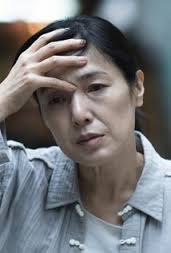
HEE
Japan, 2015, 72 minutes, Colour.
Kaori Momoi.
Directed by Kaori Momoi.
Kaori Momoi is a Japanese actress who appeared in in Japanese and American films including Memoirs of a Geisha.
She has adapted a novel in writing the screenplay for this film, plays a central role as well as to rectify film.
It is quite brief, the picture of a woman in California, working as a prostitute, picking up local man, arrested, interrogated, visiting psychiatrist and challenging him in his work, and associated with a murder, the detective present at further psychiatric interviews to determine her role.
She gives quite a vivid performance, melodramatic. And every time shifts as well is imagination shifts with the recurring scene in the elevator where she is going up with the client and the psychiatrist and his wife (in the audience sees in life at home, with the child, going to work) are also passengers in the elevator.
While there are some social comment about life in California, the film is principally a psychodrama for the central character.
1. The work of the writer-director, her performance? Her personal investment in the film?
2. The California settings, atmosphere, racial differences, the emphasis on the Japanese? The streets, Azusa washing, John, pushing her round? The elevator sequence, the people in the elevator, the African American couple talking, the Japanese therapist present, A and John, getting out?
3. The theme of therapy, the room, the screen, chairs, Azusa sprawled, the contrast with the therapist home, family, going out, going into the building for work?
4. Azusa, her perspective, the first interview, after the elevator sequence?
5. The therapy, her talk, moods, talking and interrupted early, her story, assuming the questions of the therapist, taunting him, critical of him? The revelation about herself? The significance of Fire? The setting fire to the curtains and her description, the destruction of the house, the death of her parents? Growing up, the orphanage? Marrying, her husband’s affair, the divorce? Her sexual behaviour, prostitution, with John? Yet making up stories, what was true or not?
6. Therapist, listening, his manner, the coffee, taking notes? His family, the meals at home? The recurring elevator sequence?
7. The police, Azusa and her crime, the Detective and his presence?
8. The therapist assessing her story, her talk of the past, daughter – true or not?
9. A ultimate fate? Same or not?
10. The importance of psychology, the therapy, its effects?